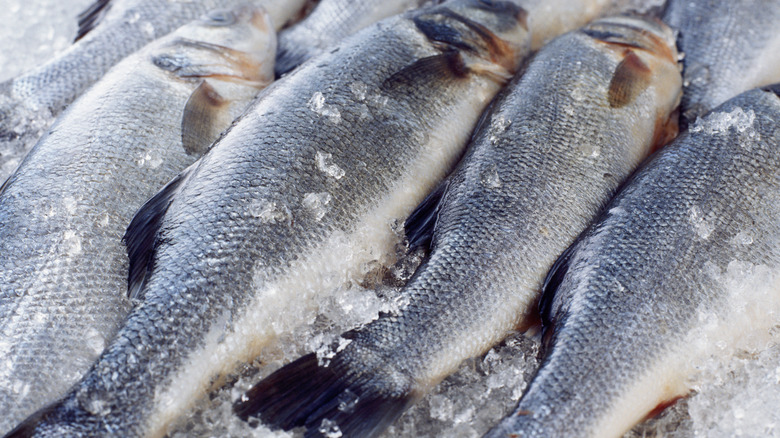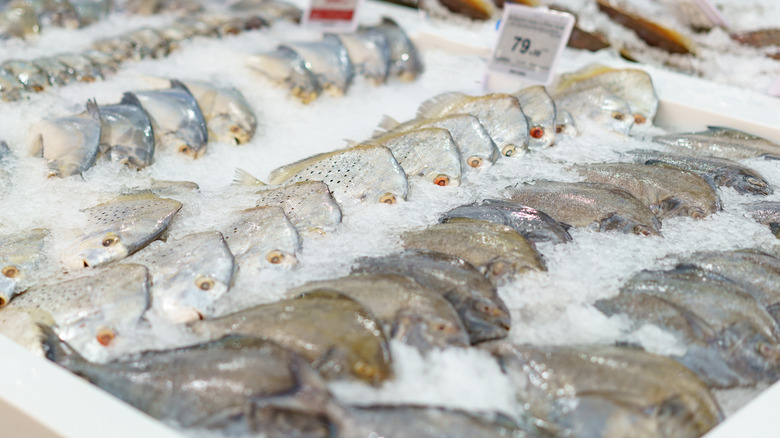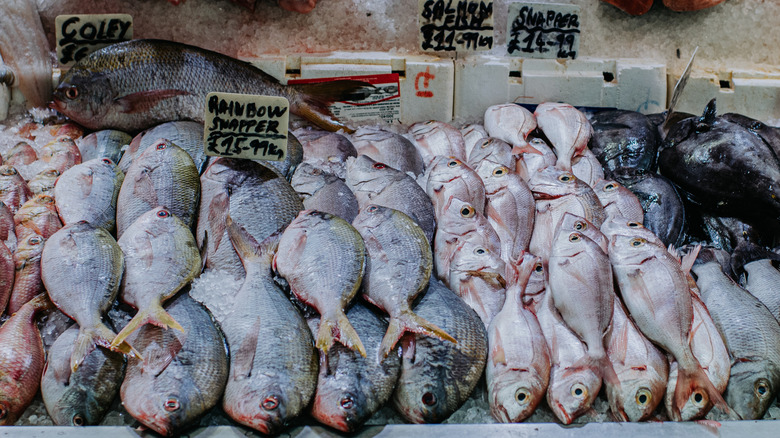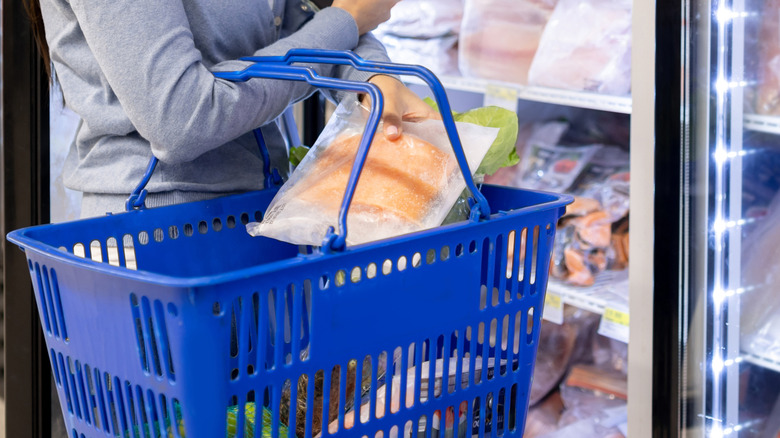The Reason Frozen Fish Can Be Superior To Fresh
When it comes to food, we've always been told that fresh is better. That maxim particularly gets used in reference to fish. We all have an image of someone fishing off a small boat and then going home to share the day's catch with their family. In that instance, the fish is certainly fresh and most likely delicious. However, when you head down to the grocery store, favoring the fresh fish counter over the freezer section isn't the slam dunk decision you might think it is.
In the United States, a lot of the fish served at the fish counter and at fish markets is laid out to look fresh, but has actually been frozen beforehand and is then thawed for sale. There should be information provided to tell you that the fish isn't as fresh as it might appear at a glance, but not all places are as up front about that as they should be. As the "fresh" fish has already been frozen anyway, there's a good argument for just going to the freeze aisle for your seafood. With a few notable exceptions, unless you're shopping for the convenience of cooking thawed fish as soon as you get home, there's not really much benefit to buying fresh fish from the counter.
Why most fresh fish is actually frozen
In the United States, 85% of our seafood is imported. From a practical standpoint, if that fish was never frozen, then by the time it reached your grocery store it would no longer be fit for human consumption. Even when it comes to U.S.-caught fish, depending on your geographic location within the country, getting fresh fish from the water to your table could take several days. To combat that, most fish is frozen. That can happen either at a processing plant after the ships get back to dock or, preferably and more commonly these days, the fish is flash frozen while still on the boats.
The downside of this is that the fish you buy as the grocery store might well not be as fresh as it seems to be. But there are some big benefits. Freezing like this makes fish much cheaper to process and transport and that price saving gets passed on to you as the consumer. Because the fish is frozen, it's much less likely to go bad and lead to food waste. And it's also just much more convenient for customers to be able to get whatever fish they want, ready to cook, regardless of how far they are from the water and whether that fish is actually in season or not.
The benefits of frozen fish
The negatives that we associate with frozen food don't really need to be applied to frozen seafood, assuming best practices have been followed. One of the reasons that frozen peas are often seen as superior to fresh peas is that not only has all the work been done already, they are frozen extremely quickly after they have been harvested. This locks them in at a point when they are freshest, and the same is true for fish. The flash freezing process that fish go through on many fishing boats is an extremely fast process, fully freezing the fish in just a few hours.
This fast freezing of the fish preserves both the nutrients and the quality of the fish to be the same as if you were picking the fish up straight from the boats. There is negligible nutritional difference between eating flash frozen fish or truly fresh fish. As fresh fish might be a couple of days old, and frozen and thawed fish has been thawed for a while before you buy it, you might find that you get a more reliable result from cooking frozen fish than "fresh."
Additionally, it might actually be healthier to eat fish that has been frozen on the boats. Then it comes to freezing and thawing, bacteria build up is a concern, but that is limited with the flash freezing process. Beyond that, the U.S. Food & Drug Administration actually recommends freezing any fish that is going to be served raw for a period beforehand, as that helps to kill of any parasites that might be in the fish (although it should be noted that the freezing process does not kill bacteria).
When it is better to buy fresh fish
That being said, the fresh fish counter and your local fish market can still be your friend on certain occasions. If you live near the sea or a known fishing spot, then there is a much higher chance that the fish being sold in your area will genuinely be fresh and never frozen. You want to check the labels at the fish counter and see if it says "frozen," "previously frozen," or even "refreshed." Any fish that has been frozen at any time at all should have one of these labels. Additionally, you'll want to be sure that the fish you are purchasing was caught locally and that it is in season. If you can't find that information easily, a decent fishmonger will be able to tell you everything you need to know.
There may or may not be a huge advantage for this, but there's certainly something special about knowing that you are eating something that was truly freshly caught. It is one element that, in our age of global transportation and being able to get any food regardless of the season, reminds us of the local specialties of different places. A lot of sea food, notably lobster and crab, does not travel well unless it is frozen. So if you want fresh lobster, you're always going to get better versions in Maine than most of the rest of the United States.
If thawed before you buy, is fish safe to re-freeze?
Whether you're buying two weeks of groceries at once, bulk buying for later, or just have your plans change on you, there's always the chance you want to throw some meat in the freezer. We all know that there can be issues with refreezing something which has been defrosted, and meat is one of the scarier ones to deal with. But if you're buying something that you assumed was fresh and then find out that it has been previously frozen, it can be difficult to know if you can then re-freeze it.
According to the USDA, it is safe to re-freeze fish that has been previously frozen, assuming that best practices have been followed. The fish needs to have been thawed in the refrigerator and should not be left out of refrigeration for more than two hours. Fishmongers should be following these precautions. When you buy your fish, you need to use a cool bag or ask your fishmonger for the fish to be packed in ice. Then, when you get it home, it should go right in the fridge or the freezer to help maintain a low temperature and prevent any bacteria growth.




